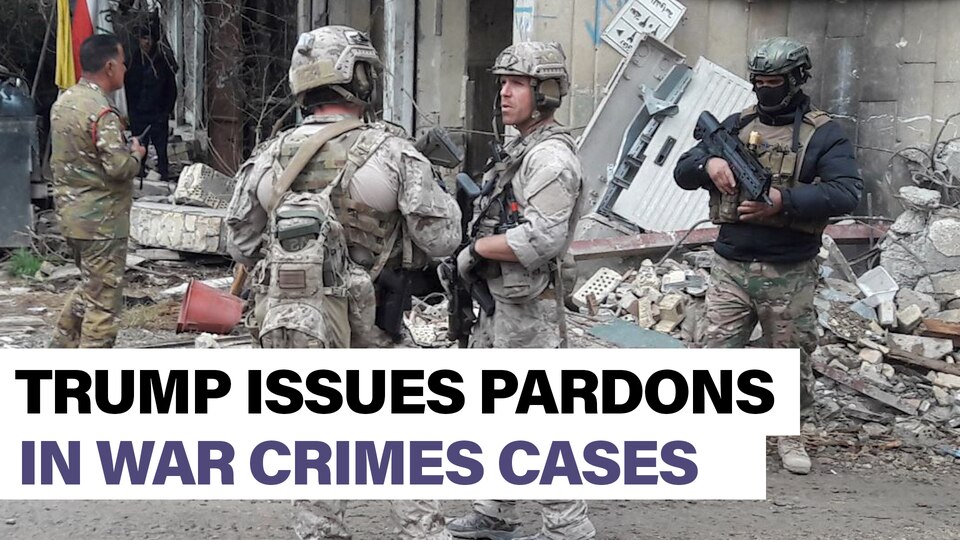Trump and Military Injustice

I wrote: Do you mind if I ask you a question? In general, how is the military, especially military justice people, reacting to Trump’s pardoning Gallagher and the others? Do they view it as the unquestionable right of the Commander in Chief? As a slap in the face? As encouragement for more people to commit war crimes? If this is a matter on which you’d rather not go on record, I can respect that, though obviously, I would never mention you by name if I happened to communicate about your response.
The response:
Hi Craig, Great to hear from you. Although I retired from military service years ago, I would venture to say that most service members, especially those in the Judge Advocate community, disapprove of the President’s injecting himself into military justice matters. The Uniform Code of Military Justice (UCMJ) is set up so that all service members know the rules of conduct going in to their service obligation, and during their time in active service.
One could argue that Gallagher was a special case, and that he may not have retained his Seal Trident pin had the board gone forward. However, the President’s inserting himself directly into the process is unprecedented and counterproductive. It seemed like he was pandering to his base and predetermining the outcome, in advance of the statutorily approved process.
You wonder what sort of “justice” you may receive if you: a) don’t know POTUS or his cronies or: b) committed an act that somehow made his administration look bad (would POTUS attempt to direct a military judge or jury on findings?) Just some thoughts here, don’t want to rant at length. It would be good to see or at least chat by phone some time……
I replied: Thanks very much. This is what I thought you’d say; in fact, it would be hard for a person of integrity like you to say anything else. FWIW, I question whether this actually rallied or turned off his base; there are a ton of military people in that crowd, and I would think that most of them were appalled. Yes, please call me anytime.

Craig,
With all due respect o your buddy, his opinion sounds more politically based than legal.
As the Commander-in-Chief the President is the final appellate authority for military personnel.
Presidential authority is restricted to pardons,commutations or mitigations or sentences, sanctions and disciplinary proceedings.
Presidents have no power to adversely affect the defense, or impose more severe penalties. A President has no power to to direct a military judge or jury on findings or any at all.
Most of the US military would be very appreciative and supportive of the President Trump’s actions.
President Trump’s actions were neither counter-productive, nor unprecedented! In fact, quite the contrary it’s exactly for this reason that the US Constitution grants the President these powers.
In my own military career, I have presided over 14 Court Martial, (albeit not American) and taken part in several dozen.
I’m familiar with the US system and the US Uniform Code of Military Justice (UCMJ).
Conduct by military personnel in modern warfare is exceedingly difficult to assess. Modern combat situations are not easily defined and can’t be subject to civilian expectations.
Soldiers are not police! Soldiers should not be used as police or expected to behave in the same manner. A soldier’s training, psychology and behavioral responses are inherently different.
Perhaps, I have an advantage over your friend since when younger, I actually served in combat for extended periods
The judgements hand down by the US military showed a complete misunderstanding of what constitutes a “War Crime”.
President Trump pardoned Army Lt. Clint Lorance and Army Major Matthew Golsteyn and commuted the sentence of Navy Chief Petty Officer Eddie Gallagher.
Lt Lorance was not a ‘hardened” combat veteran. Nor is he a “war criminal” ! He was simply a very young, under-qualified, inexperienced officer on his third day of command and first day of real combat.
If he was guilty of anything, it was overreaction, not premeditation.
The harsh sentence he received wad totally disproportionate.
He served six years in a tough federal prison, before the President intervened. The President is elected to make such judgements, not unelected authority.
The case of Major Golsteyn raises real question of procedural fairness.
Major Matthew Golsteyn underwent two army investigations for killing a Taliban bomb maker. Both investigations were extensive and exhaustive. Both investigations cleared him and even praised his actions.
it was only after Golsteyn repeated his story on Fox News in an attempt to convey the lack of understanding of the conditions of service between combat troops and the military bureaucracy was he suddenly criminally charged.
A hastily formed “Board of Inquiry” found he engaged in conduct “unbecoming an officer” and received a discharge under honorable conditions and a General Officer Memorandum of Reprimand.
Fearful of being politically incorrect, senior staff officers interfere the military justice system.
I am reliably informed by US miliatary lawyers and senior officers, although barred by the Code of Military Justice, such interference permeates the system.
Interference in the Gallagher case is well documented. The government conducted electronic surveillance of the defense team, and that is unconscionable.
In the case of Lt. Lorance, only after the President personally intervened, evidence of evidence-suppression emerge.
Evidence establishing that two of the three Afghan nationals were involved in hostile action, had been hidden by the prosecution and denied it existed.
The US Uniform Code requires the defense to have equal access to witnesses and evidence, but in Lt Lorence case, that didn’t happen.
I’m surprised your friend feels evidence suppression and equal access breaches are acceptable?
The President acted mercifully, correctly and with considerable courage. He may not have made friends among the military bureaucracy, but among the “grunts” he’s considered just great!